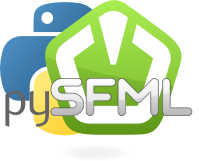Download¶
Here you’ll find all the necessary explanations for installing these bindings on your favourite platform. Unfortunately the procedures for Mac OSX and Windows 8 are not yet available.
Windows¶
Simply download the correct installer and follow the instructions.
Note
If you experience issues during installation, try running the installer again in compatibility mode:
- Right-click the installer and select “Properties”
- Navigate to the “Compatibility” tab.
- Check “Run this program in compatibility mode for”
- Select “Windows XP (Service Pack 3)
- pySFML-2.1.0.win32-py2.7.exe [Python 2.7] [32 bit]
- pySFML-2.1.0.win32-py3.4.exe [Python 3.4] [32 bit]
- pySFML-2.1.0.win64-py2.7.exe [Python 2.7] [64 bit]
- pySFML-2.1.0.win64-py3.4.exe [Python 3.4] [64 bit]
Mac OSX¶
While official support for Mac OSX is slated for the next release, those eager should feel free to download the source code and compile manually.
For example, through pip (don’t forget to have cython 0.20 and SFML 2.1 installed and as mentioned below):
pip install git+git://github.com/Sonkun/python-sfml.git
Ubuntu¶
Packages are available for Ubuntu starting from 14.04 or greater via launchpad:
sudo add-apt-repository ppa:sfml/stable
sudo apt-get update
sudo apt-get install python-sfml
# or
sudo apt-get install python3-sfml
Want the development version to benefit the latest bug fixes or features ? Use ppa:sfml/development repository, daily builds are available.
Note
These repositories provide many packages. The library SFML and the bindings are included along with their examples. Packages are:
- libsfml
- libsfml-dev
- libsfml-dbg
- libsfml-doc
- sfml-examples
- python-sfml
- python3-sfml
- python-sfml-doc
- pysfml-examples
Once example packages are installed you may want to launch them to see if the library works well with your graphics card. To do that just run the following commands.
sfml-sound # will run the example 'sound'
sfml-shader
sfml-X11
sfml-voip
pysfml-sound # will run the same example but it's actually a python script that uses the binding
pysfml-pong
pysfml-sockets
pysfml-spacial-music
pysfml-pyqt4
Fedora¶
Packages are available here
See Ubuntu section to know what you can do with the example package.
Compilation¶
Before attempting to compile, it is important that you obtain a copy of the source code, either from git:
git clone git://github.com/Sonkun/python-sfml.git
You’ll also need SFML 2.1 and Cython 0.20 installed on your computer.
Linux and Mac OSX¶
In order to compile, you’ll need the Python development files.
To build the bindings for Python, type:
python2 setup.py install
python3 setup.py install
Windows¶
Compiling on Windows requires more steps.
To have binaries fully compatible you should compile with the optimizing C/C++ compiler used to build Python for Windows. The SDK can be downloaded on the Microsoft download center:
For Python 2.7 until 3.2: Windows SDK 7.0
For Python 3.3 and later: Windows SDK 7.1
Note
If you planned to compile for both version (and thus install both SDKs (7.0 and 7.1), dont’t install redistributable packages otherwise you’ll run accross an installation failure when installing the second SDK. To do that, uncheck “Microsoft Visual C++ 2010” case.
You need GRMSDKX_EN_DVD.iso if you target a AMD64 Python version. It can build for x86 arch too.
Observe that you don’t need Microsoft Visual C++ Express.
Open the SDK command window and type:
C:\Program Files\Microsoft SDKs\Windows\v7.0>set DISTUTILS_USE_SDK=1
C:\Program Files\Microsoft SDKs\Windows\v7.0>setenv /x64 /release
Adjust according the targeted architecture (x86 or x84) and mode (release or debug).
Then head to the source directory and type:
python setup.py install
It you want to create an installer, simply type:
python setup.py bdist_msi
